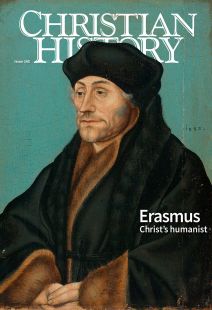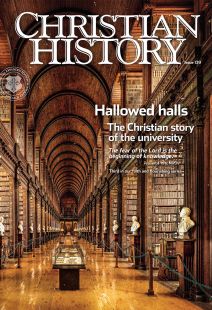Agricola Taught Finns to Read Finnish—Along with Good Hygiene
BEFORE the time of Michael Agricola, Finns read Swedish, Latin, or other European languages instead of their own—if they read anything at all. He changed that.
A Finn himself, from the province of Nyland, Agricola encountered Reformation ideas while studying in Turku, Finland. Turku’s bishop was a Christian humanist sympathetic to the ideas of Erasmus, Luther, and others who were calling for reformation of the church. The bishop saw promise in his student and arranged for him to attend the University of Wittenberg. There Agricola studied under Martin Luther and Philipp Melanchthon, leading Lutheran reformers. They provided him with a letter of recommendation when he went home and soon he was teaching in Turku's school himself.
Agricola taught salvation from sin through Jesus Christ and warned that masses, pilgrimages, holy places, prayers to Mary or the saints, veneration of relics, and performance of good works could save no one. But while he promoted Reformation ideas and taught the Bible, he did not trash everything Catholic, changing only what he thought really needed changing. His main desire was to see the inner life of his students transformed by an awareness of God and he was not as concerned about the forms employed.
Like other reformers, Agricola recognized that most Finns would never learn to follow Christ with any depth unless they could read the Bible in their own language. Because Swedish was the official language of the country, his first step was to teach the Finns to read their own language. To accomplish this, he prepared a Finnish ABC book in 1543. Since Finland did not have a printing press, this had to be printed in Stockholm.
The next year he compiled a prayer book. This included prayers by both the reformers and Catholic saints. It also included a calendar, weather lore, astronomical information, theology—and instructions for good hygiene! Evidently, he believed in packing as much information into one printing as he could.
He followed a similar pattern when he completed his translation of the New Testament into Finnish. In it he included a short history of Finland with details about the Swedish occupation. Printed using old German letters and eighty-three woodcuts, more than a hundred copies survived into the twentieth century.
Agricola was not able to finish a translation of the whole Bible, but he translated the Psalms and several key Old Testament passages. His printing of the Psalms once again added worthwhile, unrelated detail, listing the old gods of Finland—information that would have been lost otherwise.
In 1554, when Finland was divided between two bishops, Agricola was made the Lutheran bishop of Turku. He died three years later, on this day 9 April 1557. Finns considered his contribution to their literature, history, faith, and independence so significant that they honor him with a national holiday each year. 2010 was about the five-hundredth anniversary since his birth. He is known as the father of Finnish written literature.
—Dan Graves
----- ----- -----
For more on the reforms inspired by Erasmus, see Christian History #145, Erasmus: Christ's humanist; for more on the impact of the University of Wittenberg, see "The backwoods school that changed a continent," in Christian History #139, Hallowed Halls.







